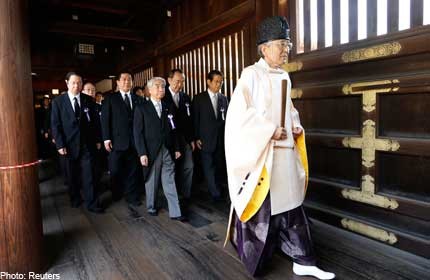Japan's Abe: Conservative ideologue with economic focus

TOKYO - Japanese Prime Minister Shinzo Abe has largely kept his conservative nationalism under wraps since sweeping December elections as he focuses on breathing new life into the country's long-lumbering economy.
But Abe's political stripes appeared to bubble to the surface Thursday as he broke with two decades of tradition by omitting any expression of remorse over Japan's past aggression in Asia on the anniversary of its World War II surrender.
The third-generation politician stayed away from the controversial Yasukuni war shrine as lawmakers visited the site to mark the anniversary of Tokyo's World War II surrender, but he gave a donation via an aide.
Japanese politicians' visits to the Yasukuni shrine - which honours 2.5 million dead including top convicted war criminals - anger neighbouring nations, which view them as a painful reminder of Tokyo's aggression in the first half of the 20th century, including a brutal 35-year occupation of the Korean peninsula.
Casting himself as an uncompromising leader, Abe has previously defended lawmakers' visits to the shrine and expressed unease over Japan's apologies for the suffering of its Asian neighbours.
The 58-year-old Abe has also openly mulled changing Japan's US-imposed pacifist constitution so it could turn its self-defence forces into a full-fledged army amid bitter territorial disputes that have sparked maritime skirmishes with Beijing.
Since last year's elections, the premier has been riding high on strong public approval ratings as the public cheered his pledges to reinvigorate Japan's deflation-plagued economy.
The policy blitz - dubbed "Abenomics" - mixed big government spending and central bank monetary easing that weakened the strong yen, improved corporate earnings and sent the stock market soaring.
The moves have given a boost to Japan's export sector and stoked a renewed sense of economic optimism in an economy that has seen laggard growth for two decades.
However, Abe has failed to improve strained diplomatic ties with Seoul and Beijing, which bristle at his hardline political views.
He has yet to meet either Chinese President Xi Jinping or South Korean President Park Geun-Hye.
Instead, Abe turned his attention to active diplomacy with Southeast Asian nations and building Tokyo's post-war alliance with Washington.
Japan Self-Defence Forces have been working hand-in-hand with US troops, as China flexes its naval strength in Asia.
But Tokyo's testy relations with its neighbours present a headache for the United States as it turns its focus to the region.
Abe was the country's youngest-ever prime minister when he stepped into the role in 2006, aged 52, and the first one to be born after World War II.
But he left office abruptly 12 months later, citing illness after an election defeat - becoming the first in a series of short-lived premiers, each of whom lasted around a year.
He is also just the second person in modern Japan to serve as premier twice, after Shigeru Yoshida who led the nation in 1946-47 and 1948-54.
After securing an election victory in the upper-house of parliament last month, Abe's majority government will not face polls for another three years, giving him the legislative muscle to power ahead with his economic plans.
Abe's grandfather, Nobusuke Kishi, was a World War II cabinet member briefly arrested for war crimes, but never charged.
Kishi later became prime minister, fighting leftists to build a new alliance with Washington.
Abe's father was Shintaro Abe, a foreign minister who never achieved his ambition of becoming prime minister. Shinzo Abe took his father's parliamentary seat in 1993 following his death.